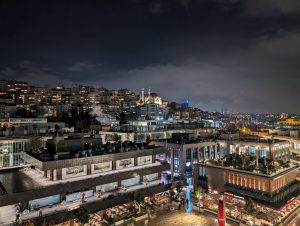When I arrived at the Residence Inn Dallas by the Galleria, the nearly year-old collapse in lodging demand appeared—temporarily at least—ended.
When arctic air crashed through the climate change weakened Jetstream that normally corrals it around the Polar Regions and invaded the Lone Star State this week, I was among the millions of Texas residents left without electricity, and I wasn’t the only one who remedied that loss with a hotel reservation.
As I stood in line with a lobby full of affluent-looking Dallasites, many clad in incongruous layers of sweatsuits and designer outerwear toting excited dogs of varying sizes and breeds, I noticed that a sort of weary, contrived joviality was in standard order.
MORE Impacting Travel
A well-dressed woman feigned collapse against the plexiglass partition on the front desk in exaggerated relief as the front desk clerk apologized for the long wait. “It’s just nice to be somewhere with electricity and a working shower,” she drawled.
Evidence that the property had spent nearly a year with virtually no occupancy was commonplace. The building is dually branded between Marriott’s Residence Inn and AC Hotels properties. Normally they maintain separate lobbies, elevators and front desks, but the front desks had been consolidated to the AC lobby, where the two front desk positions serviced the combined 256 guest rooms across both brands.
The AC’s expansive lobby was packed to the gunwales with guests working on spreadsheets or taking video conference calls with headphones, while in the courtyard, the pool—frozen solid—was covered in fresh snow.
The hotel was fully booked, and it was little wonder after the morning I’d spent trying to find accommodations. Several hotels in the North Dallas/Addison area were showing completely booked—either already full of guests fleeing frozen homes and compromised plumbing or having shut off reservations because the properties themselves faced the exact same issues.
Many larger hotels in newer buildings have emergency generators to continue powering elevators and emergency lighting should they lose power—sometimes generators can even maintain a certain level of power throughout the building. Other hotel buildings or nearby essential structures such as hospitals and can benefit from the priority status for those portions of the grid.
Nevertheless, many hotels in the area advised they were similarly affected by the region’s rolling electricity shortages, or had frozen pipes and thus no running water.
I had another wrinkle in my own needs—I needed a hotel that would accept cats as pets. Many properties call themselves “pet friendly” when they really mean “dog friendly”.
Ensconced in my studio suite, I began to reflect on the multiple facets of the hospitality industry. During the COVID-19 pandemic, conference and convention travel vaporized. Individual bookings slowed to a trickle of essential workers and diehard leisure travelers. Hotels sat empty while would-be guests sat in their homes.
Now, a steady stream of climate refugees has revived the abandoned corridors of until-recently interred hotels. The business travelers bound for the nearby office parks have been supplanted by displaced households doing their best to maintain normalcy in temporary refuge, social distancing in heated comfort. Hotel staff until recently on furlough or reduced hours are once again needed and appreciated.
I also discovered that a hotel room doesn’t salve every issue. Immediate needs were addressed, but the safety and warmth of the room didn’t end the anxiety surrounding the situation.
I could see on my thermostat app on my smartphone that my power was actually on, and my house slowly warming for a good portion of the time I was in the hotel, but there was no way of knowing how long it would last (the state utility was, at the time, attempting to rotate outages to different portions of the grid). I use a CPAP to sleep, so the prospect of losing power in the middle of the night wasn’t exactly pleasing.
Also unknown was the duration of the outage. Most hotel companies have maximized flexible cancellations for reservations, but in most cases it was still necessary to cancel at least a day in advance to avoid penalties. When would it be necessary to concede the power grid couldn’t be depended upon, and shell out for another night?
I had to go on faith, but I had reminders I’d made good decisions throughout the next few days. I had power on at my house most of the time (and the power at the Residence Inn kicked off just as I was packing to leave), but just a few moments after checking in to a nearby DoubleTree by Hilton Near The Galleria (the Residence Inn was still sold out for additional nights), I got a message that the water at my condo had been turned off for plumbing repairs.
Electricity and water have thankfully been available at DoubleTree for my entire two-night stay, but the hotel faces other winter weather difficulties. Supply deliveries have been spotty, so there are no DoubleTree cookies available (darn). A buffet breakfast was available the first morning, but supply issues intervened, and the second morning only the coffee shop was open.
Sheltering issues aside, there’s excuse for a glimmer of optimism. It feels good to be in a crowded (socially distanced) lobby again. It’s comforting to know that the hospitality professionals who’ve had an immensely difficult year have returned to their métier, looking after hotels filled with paying guests.
It’s good to know the hospitality industry keeps on.





















